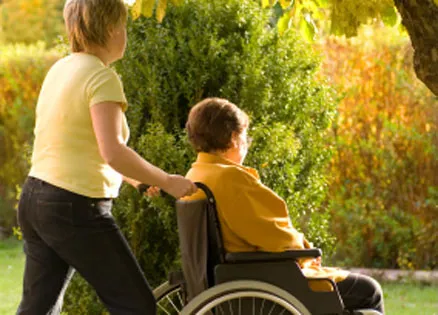When you’re responsible for an adult loved one who’s battling a debilitating illness, it’s easy to feel alone.
But of course, you’re not. You’re part of a vast, caring army: Upwards of 50 million Americans offer daily support to a chronically ill, disabled or aged family member or friend.
Generally speaking, that army consists of middle-aged adult children or older spouses, who “sacrifice their own health to care for a loved one who is battling a debilitating disease,” says Sharon L. Lewis, PhD, RN, the co-author of a new study, A Stress Busting Program for Family Caregivers.
These caregivers bear a heavy load helping loved ones manage the details of living as well as assist with their most intimate daily needs, including toileting, feeding and simply getting around.
Caregiving impacts everyone’s life, says former First Lady Rosalyn Carter, and adds: “There are four kinds of people in the world: Those who have been caregivers; those who currently are caregivers; those who will be caregivers; and those who will need caregivers.”
The statistics that apply to Alzheimer’s disease and related dementias (ADRD) sharply illustrate Carter’s message. Today, one in eight people have a family member with some form of dementia; 70 percent of people with ADRD live at home.
But dementia-related conditions are just the tip of the iceberg; millions more people with diabetes, heart disease, injuries and arthritis also rely on family or friends for help.
Stress: Caregiver Enemy Number One
As a caregiver, it’s vital to look after yourself as tenderly as you look after your loved one. Put yourself last, as many caregivers do, and eventually your health will suffer.
In addition to experiencing higher than normal rates of stress and depression, caregivers have mortality rates that are 63 percent higher than non-caregivers.
What’s more, research has shown that stress impacts your immune system for up to three years after caregiving duties end, which increases your chances of developing a chronic illness.
“Caregivers are at risk for emotional, mental, and physical health problems that arise from complex caregiving situations,” says Lewis.
She and her colleagues learned that when caregivers learn to identify and deal with stress, their levels of anxiety, depression, anger, and hostility plummet.
Here are 10 tips for family caregivers that can help you stay well, physically, mentally and emotionally:
1. Do something just for yourself every day.
Read, listen to music, phone friends, work at a craft, exercise. Aything that gives you pleasure and a little respite will also help lower your stress levels.
2. Watch for signs of depression.
If you begin to feel listless or low in energy, if you’re having trouble sleeping or can’t concentrate as well as you once could, you might be clinically depressed. If you feel helpless or hopeless, don’t delay in getting professional help.
3. When people offer to help, accept.
Suggest specific things they can do, such as prepare a meal, spend an hour with your loved one so you can go out, or even walk the family dog.
4. Eat healthy foods.
Don’t skip meals or snack mindlessly. See food as both fuel and medicine; choose balanced and nutritious meals.
5. Be open to technologies and ideas that promote your loved one’s independence.
Having a person dependent on you may be stressful, but it’s also stressful to be dependent. Encourage your loved one to do as much as they can for themselves when they can.
6. See your doctor annually.
Tell her you’re a caregiver so that she’s aware of the particular stress you experience. She may offer a specific treatment plan for you based on your particular situation.
7. Be good to your back.
Caregivers do a lot of lifting, pushing and pulling. Ask your doctor or chiropractor for practical ways of protecting yourself against back injuries. If you have a bad back, know what your limitations are and get help with chores that could lead to an injury.
8. Grieve for your losses and then allow yourself to dream new dreams.
If you’re caring for a spouse with Alzheimer’s disease or another permanently debilitating condition, you need to grieve for the person who’s now lost to you. Find reasons to be hopeful, and seek support through your church, synagogue or community center.
9. Seek support from other caregivers.
No one knows better than other caregivers what you’re going through. What’s more, other caregivers can be realistic about your situation and help you problem-solve.
10. Get a flu shot every year.
Make sure all your immunizations are up-to-date. This protects you and your loved one. Here’s why: If you’re sick, you can’t be a good caregiver. Or, passing your flu or chicken pox, for example, to your loved one whose immune system may be weakened could have devastating consequences.
Help and hope is all around you.
Invaluable assistance is available for caregivers. Here are some useful resources, courtesy of Extension.org.
The Alzheimer’s Association
The Alzheimer’s Association has a network of chapters in every state that provide information, education, support and referral. Find your community’s chapter via their website or call toll-free.
• http://www.alz.org
• 1.800.272.3900 24-hours per day, 7 days per week. Help in Spanish and other languages available.
Family Caregiver Alliance
A national information clearinghouse for caregivers.
• http://www.caregiver.org
• 1.800.445.8106
AARP
The AARP provides information and promotes the independence of older adults, including information for family caregivers.
• http://www.aarp.org/families/caregiving
• 1.888.687.2277, Monday – Friday, 7:00 a.m. to 12:00 midnight (Eastern Time).
National 211 Collaborative
211 is a telephone number that, where available, connects people with community services.
• http://www.211.org
• Dial 2-1-1 from your home telephone.
National ElderCare Locator
Connects older Americans and their caregivers with sources of information on senior services.
• http://www.nfcacares.org
• 1.800.676.1116 Monday – Friday, 9:00 a.m. to 8:00 p.m. (Eastern Time). Help in Spanish available.
National Family Caregivers Association
Offers services, information, education and support for caregivers who are providing support to loved ones who are ill or disabled.
• http://www.nfcacares.org
• 1.800.896.3650
State Agencies on Aging
Find your state agency at the National Association of State Units on Aging.
• http://www.nasua.org/about_nasua/sua_links.html
Books
The American Medical Association Guide to Home Care Giving
By Angela Perry, MD
A comprehensive guide covering all aspects of home care.
($10.17, Wiley, 2001)
If Only I’d Had This Caregiving Book
By Maya Hennesey
Hennessey, a consultant and trainer with expertise in women’s addiction problems, shares the personal story of her caregiving experience.
($17.09, Author House, 2006)
To Survive Caregiving: A Daughter’s Experience, A Doctor’s Advice on Finding Hope, Help, and Health
By Cheryl E. Woodson, MD
A doctor who specializes in caring for older adults finds herself caregiving for her own aging parent. Advice for caregivers about how to protect their health, finances, and relationships.
($16.11, Infinity Publishing, 2007)
Don’t miss one of the most recent caregiver stories from Guideposts magazine, A Daughter and Father Find Forgiveness.
Download your FREE positive thinking ebook!





